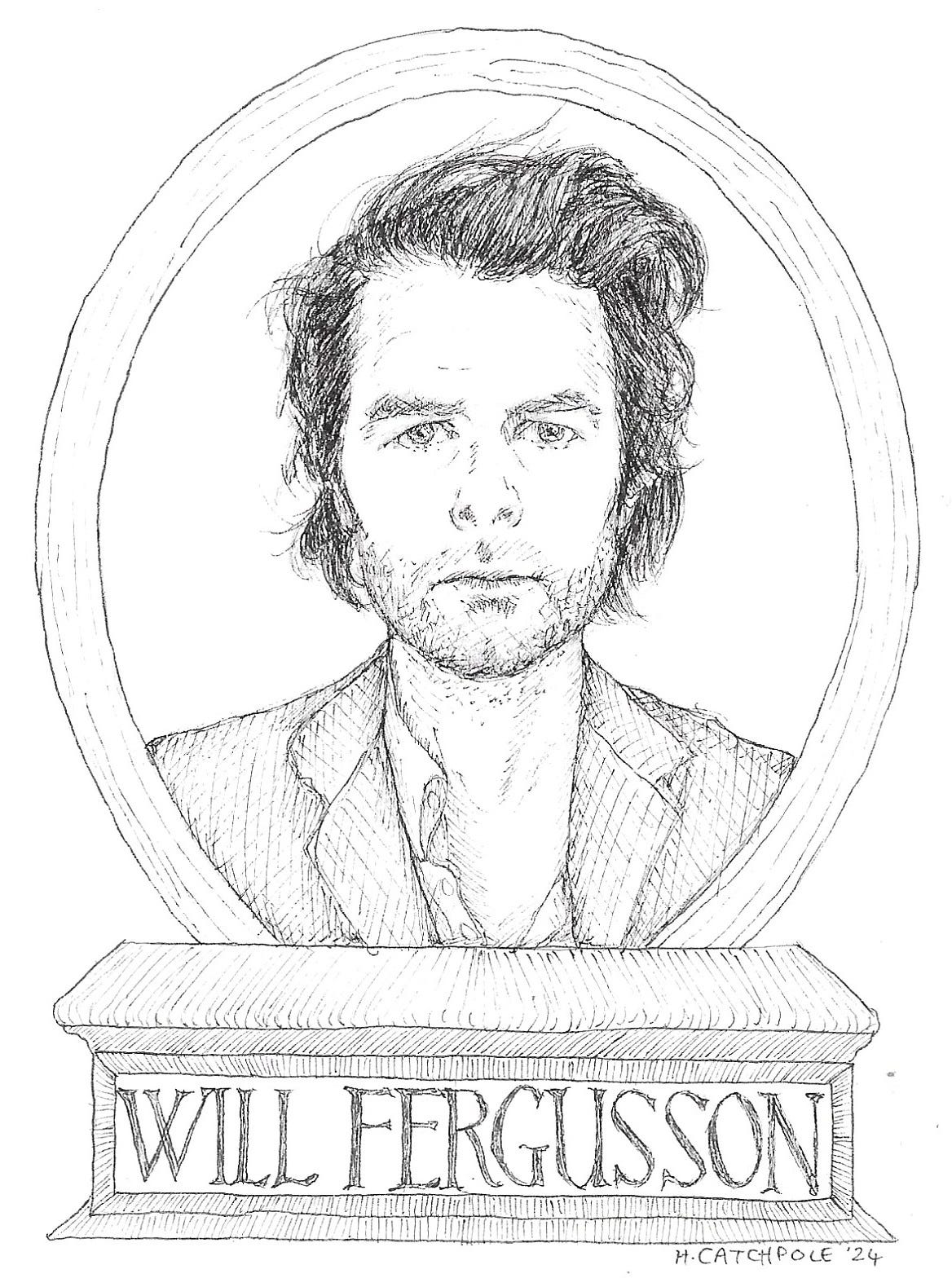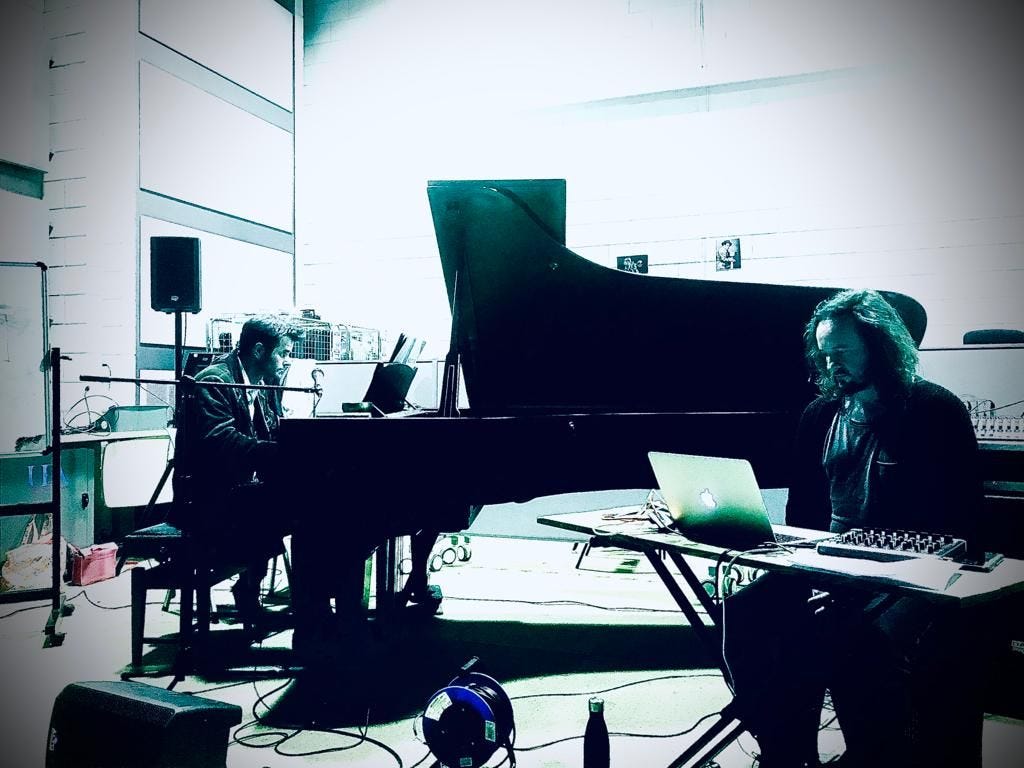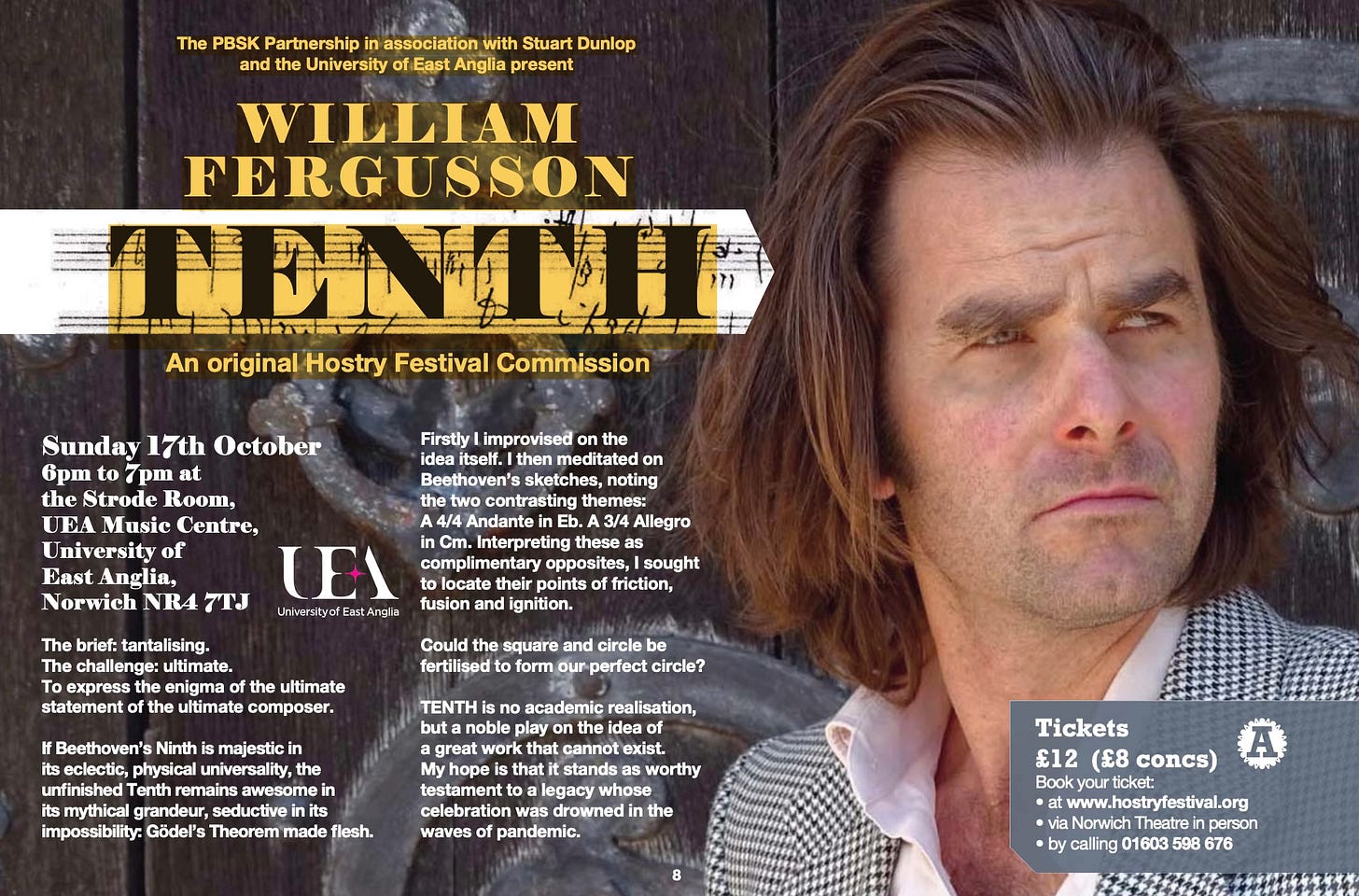Will Fergusson
... on the creative impulse, why he doesn't like 'sweet' piano music and how he imagined Beethoven's unfinished symphony
Will Fergusson is a Pianist and Composer.
Based in Suffolk, Will plays an eclectic repertoire both across the region, and internationally; performing solo, as part of various bands and accompanying local musical artists with his range of classical, jazz, blues and latin style piano.
Where did your love of playing music start, and why the piano?
I have always had a passionate engagement with ‘getting somewhere’ creatively, and those creative ambitions have always been present, have always come first. There was a time where all other parts and stages of life became a little bit fogged over because I was obsessed with getting some kind of artistic result, whether it was songwriting, being in a band or learning a sonata.
But it’s not really about the piano; I'm not so fascinated by pianos. It's just that they're useful, so that's what I learned for a while. It was a kind of identity and a bit of a lifeline to go to a piano. But as one expands a little philosophically, one realises that those identities can be limiting and it has always been more to do with the whole creative picture, than just the piano.
I'm always seen playing one therefore ‘this man is a pianist, is solely a pianist, who identifies as a pianist’ (laughs). But if you're an artist and you’re creating music, the piano is just an extremely useful thing to have around.
Is that a cause of frustration, the way people see you? Do you think there’s an element of pigeonholing?
I think people do pigeonhole other people for convenience, not necessarily out of any kind of malice or anything. It can be limiting actually, whether you yourself do it or not. Because there's a kind of objective discourse that should be had and often pigeonholing evades that entirely.
Will, you're a pianist, you improvise and you compose music. You play classical, jazz, bebop, rock, contemporary (the list goes on…) Does your heart lie in one particular area?
It's more about getting it to come through. I mean, you can have categories and you can label things, and that’s useful to a point. But then it's about, context, circumstance, whatever job it happens to be and so on. Very much like an actor, you need to be flexible. It's like the persona that you're given in a script could be very close to part of yourself, but I don't think anyone would be so blinkered to suggest that they have only one element to themselves.
It's a prismic experience. That's how I've always seen it.
In a previous interview you described playing music as a kind of mediumship, which I find fascinating, could you talk a little about that concept?
I'm sort of obsessed with esoteric methods, alchemic methods of getting creative results - not process methods, but more an approach where you use your elemental self. So yes it can be a bit like a kind of mediumship if you like. It can feel like you're trying to invoke some kind of response on that level from the listener.
Because you want to try and break through so they can't just come up and say ‘That was lovely, thanks’. You want a performance to penetrate the audience’s protective layer and induce an elemental response.
I like to break through into that space if I can. Which I think is really the purpose of any kind of art, so that people can't just politely say it was lovely. That's a very English thing! ‘That's terribly nice… that was lovely…’ In fact, I can't bear, really, to hear too sweet piano music.
Why, because it's too saccharine?
Well, there's certainly a place for it, but it’s like on the classic FM level - the feeling that classical music is there to be relaxing and placating and all this sort of thing. Whereas the idea, actually, of classical art is to enlighten and ask questions and challenge you know, dredge up emotion, and put one right in the middle of the storm of life. So really it's nothing to do with soothing and relaxation, and usually if there are calm or tranquil parts in a piece of music it comes through contrast or having purposefully arrived there.
I'm interested in the Sturm und Drang philosophy of German Romanticism. It doesn't seem to be very popular generally (laughs) but it's the idea that to get to a desired point, you have to go through… It's really about you having to be in the storm.
That’s an interesting idea. Yes, I suspect that we do tend to evade those more intense experiences as a modern society. How would you explain that?
A lot of it is trying to scientize stuff and mark it up. Actually, this book I’m currently reading [gestures to a copy of ‘Barbarism’ by Michel Henry] has been useful. I've had it for a while, but funnily enough I opened it on this page and it was about how culture is going downhill because people aren't engaging with the true benefits of culture, for example, the suffering and the pathos in music, or great art - and there’s a danger of no longer seeing it as having value.
Because there’s a catharsis of human suffering, of human experience, and we recognise it and benefit from experiencing it in art. But what the overly scientized element is trying to do is to find a solution for what is seen as a problem. But it's not actually a problem, or if it's a problem, it's a beautiful problem.
(Above) Will Fergusson & Caspar Lloyd James premiering Mark Scheibe’s ‘The Language of the Lost’, Vilnius, 2024
Will, I’m keen to ask you about your 45 minute long commission, a reimagining of Beethoven’s unfinished symphony, ‘Tenth’, which you composed for the Hostry Festival in 2021. I thought it was an absolute triumph! Extraordinary and epic by all accounts. Could you talk a bit about that piece and how it came about?
Beethoven was of course a major cultural figure. Classically AND generally (if we can include the classical in the general rather than seeing it as something ‘posh’ or outsider...) And I was invited to compose a version of the 10th Symphony, for which only sketches exist, as part of the celebrations of Beethoven’s 250th Centenary, in 2020. Of course this was the year Covid struck and so the event went ahead, instead, in 2021 with much reduced capacity.
I think it was powerful for many reasons. One, because obviously of the fact the symphony was never written and it can't be written. So, I instead wrote a piece that summed up the poetry of that impossibility, rather than trying to actually write Beethoven. I composed it for both piano and technology, and worked alongside Ed Perkins who simultaneously used A. I. as a kind of processing orchestra.
This provided an interesting aspect; aiming to capture the pathos that exists in man's usage of technology. It certainly highlighted the strange kind of tension in ‘the replica's’ inability to feel or to have a hard contact or suchlike. Actually, a lot of what makes 80s music attractive is that - the fact that it really is addressing the kind of raw interface between tech instruments and acoustic instruments, and sensibilities that clash.
Because, when you get a clash, you don't get an ending - you get something else produced. This is why I believe in certain kinds of friction as being more beneficial than ideological peacemakings, or make everything whole, or ‘right’, or whatever words you want to use.
Actually, just trusting that friction. Just throwing it all in. Letting it explode. Because what we fear is that there'll be some apocalypse, or that we're all going to jump off the bridge, or whatever. But actually, you'll end up with something else. Because there's a difference between the idea and the actual experience.
There were some personal elements in the piece, there were some of the original Beethoven sketches just as they were, and some that were developed. And there was also a part of it that was an improvisation I did before I started writing anything, which was listened to by a computer and then printed out.
Interestingly, due to covid, a long time passed between doing the original improvisation and picking up the computer print out, so eventually I couldn’t actually recognise it as something that I had done. I presented it in the final piece as a kind of cadenza or free movement for the soloist. But it felt like an improvisation by computer printout, rather than myself.
So there was an interface going on. Musically, a lot of it was incoherent. But it presented another kind of poetry. Which was relevant, and worked. And by working, I don't mean that it makes sense exactly, more that it presents the difficulty as it is, and we can value it as poetic. Because I don’t believe you're ever answering the question, you're presenting things as they are, and trying to find a principle of acceptance in it.
It finished off with a set of ancient Greek texts, which was a nod to the play ‘Beethoven’s 10th’ by Peter Ustinov - which was playing at The Hostry Festival that year. There was a line in that play which said something about Beethoven ‘dreaming of a chorus singing ancient Greek at the end of the 10th’. So I wrote three verses of it. And it's a bizarre, wonderful language to sing. That was the finale.
Looking at your Soundcloud, and more recently, Bandcamp pages - you have recorded a great many albums and EPs independently. I particularly enjoyed the album ‘Chateauneuf’ could you talk a little about how these recordings came about?
At that point in time, during lockdown, there was time and lots of it. So I took the opportunity to start creating an album.
I did two during the Covid lockdown which have an inventive and explorative spirit. The second - Chateauneuf - is more accomplished and I suspect more successful. Neither is professionally produced, both were made on my own steam using an iPhone app called Spire. Lyrics have always been problematic, but where I fell short, other sources came to my aide. Those being local writer Liam Murphy and several published poets living and dead. The results have enabled a creative pattern which I continue to develop, hopefully creating gold out of these base metals, eventually…
(Above) ‘World Without Shops’ from Will’s DIY lockdown album - Chateauneuf (2020/21)
What are you most excited about at the moment, Will? Is there a particular piece of music that you aspire to play in a concert or bring to life?
Just making things happen. Generally. No, not one particular piece. It very much depends on the context. Situation. Building. People. Occasion. What excites me is bringing the process to life. Above all, it's vision. When things catch fire, they become a thing. And there's a point in every performance which can bring genuine excitement.
It’s been lovely to speak and delve a little under the surface of your practice. We’ll switch gears and finish with a slightly more frivolous question - if you could take a favourite composer (dead or alive) out for lunch, who would you choose?
Well, I'm reading ‘Testimony’ by Shostakovich at the moment. It’s a great book about art in difficult times, it’s darkly entertaining with very dry insight. So he might be interesting. Yes - I’ll take Shostakovich out for a chicken Caesar salad.
I ask every interviewee what culture they have been enjoying. Here are some of Will’s favourite recommendations:
I will start with Holst's 'The Planets', Stravinsky's 'Rite of Spring' and the album 'Sheer Heart Attack' by Queen.
Filmwise I might cite Peter Greenaway as a presence. And any clever satires, spoofs. ‘Détective’ Jean-Luc Godard. Blow-Up.
Pianistically, Horowitz, Gould, Ellington, Jelly Roll... Monk! Too many already…
Painters: Rauschenberg, Twombly, Hockney... Carel Weight!
On his own: Morton Feldman
Comedy: Milligan, Cook... Paul Foot, Jerry Sadowitz.
Poets: Bukowski, Hughes… Marvell? The ancients…
Writers: Robert Graves, James Joyce, Flann O'Brien, Evelyn Waugh, Will Self, Noel Coward, Nietzsche…
Much too much.
And have missed too many out...
Kate Bush and other clichés
Viv Stanshall.
Woolf.
Elgar.
Mingus.
Eno, Brian & Roger…
You can check out more of Will’s music via his website, BandCamp, Soundcloud and Instagram pages.
If you wish to enquire into Will’s work, or engage him as a composer or session player, please make contact via fergwill@yahoo.com









Sounds an interesting character! Liked his take on ‘safe’ music and getting the ‘lovely, thanks’ response. Like telling an artist that you really like their work, but it wouldn’t look right on your walls🙄 World Without Shops was quirky, as was his list of favourite artists - bet Viv Stanshall and Shostakovich would have got on like a house on fire🤪